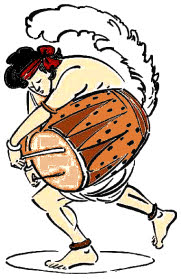by Hari Ravikumar
28 June 1996
Thiruvannamalai
My Dear and Most Esteemed Sri. K S Venkataraman sir,
I trust this letter finds you in perfect harmony. I didn’t get the chance the other day to share my thoughts on the present state of Carnatic music after your high-pitched polemical brigas rendered me speechless for a few days. And when I spoke, it was only in aparswarams. After 48 hours of continuously listening to tambura shruthi, I have now regained a semblance of shruthi shuddhatvam in my speech. I suspect it will be a few months before I regain the power of singing saralai and jantai varisais.
I sat down in deep tapas for a few hours before I decided to compose this letter to you. I wanted to mentally run through your neraval-like arguments so that I could provide suitable rejoinders. For the greater part of the afternoon, you kept saying the same thing – Carnatic music is going to the dogs and the Golden Age of Carnatic Music has come to an end – but in different ways, much like an amateur singer trying her hand at the neraval. I will respond to your allegations nonetheless, lest you deem me lacking in manodharma.
You scoff at any and all forms of music that is not Indian. You then scoff at all forms of non-classical Indian music. Then you find gaping holes in any form of Classical Indian music that is non-Carnatic. Then you find flaws in the modern Carnatic musicians. Like an expert mridangam vidwan doing a koraippu in his tani-avartanam, step by step you criticize all forms of music finally stopping at that kutcheri of Semmangudi mama you heard live in 1963 in Salem when you were an eight-year-old.
I can imagine you smiling your lopsided smile as you read this. “Who is this over-smart buffoon to tell me about our sampradayam?” you might say aloud as you sip your filter coffee. Yes, it is well-known by now that I have lost religion and have become in your words, “an utter musical infidel.” In fact, I even remember the date of transgression. It was June 11, 1974 when I first heard a record of Jimi Hendrix. About a month later, when you came to know about it, you had prescribed a dip in the Kaveri at Thanjavur. Father took your prescription seriously and insisted that I wash my sins in the river. I ended up almost getting washed away. After the near-drowning episode, Mother suddenly grew generous towards me and allowed me to listen to a record of D V Paluskar. She wasn’t even particular about your second prescription – listening to at least 100 Carnatic kutcheris in the span of a year. The closest I went to obeying that decree was to listen to the songs of K Balachander’s Apoorva Raagangal a year later.
Over time, I came to realize that music is too big to fit into any one genre. “If you can see light in one form of music, you might as well see it in another” became my motto. And I began playing Led Zeppelin’s Kashmir and Michael Jackson’s Beat It the first thing every morning instead of MS’s Suprabhatam. And before I realized it, I was looking for cheap PG accommodation in the outskirts of Madras, having been unceremoniously kicked out of my ancestral house in Mylapore.
On more than one occasion, I tried to bring up the subject of Hindustani music with you. But instead of having a discussion, you would invariably start with a closing remark, “Those people cannot sing without a tabalchi next to them. No knowledge of tala!” In sotto voce I said, “What is the use of your machine gun-like pallavi singing after dividing three beats into thirteen equal parts? There is no prize for the best Mixed Fractions, is there…” You barely heard me and continued solemnly, “And they sing one simple alapanai ending with a one-line-song. A kutcheri should have a varnam, then Ganapati stuti, then madhyamakala kriti, and so on and so forth. What do they have? Baruka ridu aayi or Rank na tharo saamji or something like that one line. The number of lines a Hindustani singer sings in his entire lifetime, a Carnatic singer will sing in one pancharatna krithi.”
The other day when we were listening to an upcoming singer, you shouted excitedly when the poor girl missed a beat, proudly announcing to everyone around you, “Talam thappi pochu!” and yet the same evening when we heard a tape of one of the old masters, you completely ignored the fact that he sang Akhilandeshwari rakshamam as if he had to catch the evening train back to Kanyakumari. In a meek tone, I told you in a Samasthi-charanam-manner that Dikshitar was inspired by Dhrupad music and that a krithi like Akhilandeshwari must be sung in a slower tempo but by then you had already labelled me an utter musical infidel and I was crushed under your volley of kalpanaswaram-like abuses.
Don’t get me wrong. Twenty-nine years of Carnatic music training, albeit irregularly, has not been in vain. Every now and then, you can find me humming an intricate composition like Madurai Mani Iyer’s English Note. I even know Dikshitar’s first name and Shyama Shastry’s nom-de-plume. Of course I am no match for your encyclopaedic knowledge of ragas and talas and vilambakaala krithis but I do have a master’s degree in Telugu literature.
You nit-pick your way through a single Kambhoji line if the nishadam is elongated for a fraction of a second more than it should have but you are rather generous when a singer totally mispronounces a Telugu word or a phrase or even a whole krithi. Isn’t it strange that a man who will go out on his limb to argue that Thyagaraja’s version of Sri ragam is the right one has no qualms about hearing a singer mouth a meaningless phrase like “Entha roma gaanubaa vvullu antharee gee vann thana mulu”?
I started out with the idea of writing about my thoughts on our discussion the other day on the state of Carnatic music today. However, right now, I seem to have forgotten all the arguments I had recalled during my intense tapas, but what I do remember distinctly is the exact point at which you flared up. We were discussing the present status of Carnatic music and you were hurling acerbic missiles at all the youngsters. It was then I mentioned to you that some of your favourite Carnatic singers – “the great past masters” as you call them – lack emotion in their renditions. You almost spat out your vettalai-paak on me. “Carnatic music is not for entertainment, you jnaanashoonyam,” you roared. “It is a deep spiritual journey.” And I vividly remember thinking that if spirituality meant anything close to the lifeless alapanams which were a part of your staple diet, I’d rather choose a coma. It’s more spiritual.
I will leave you with a quote by Madan Mohan, a famous film composer in Hindi cinema – “Main samajhta hoon ke har ek phankaar ko jasbaati hona bahut zaroori hai. Agar usme insaanniyat ka bhi jazba nahin to woh accha phankaar nahin ban sakta.” (In my opinion, it is important for every artiste to be emotional. If he doesn’t have the emotion of humanity even, he cannot become a good artiste.)
Be well and have a jolly time. After all, isn’t that what Thyagaraja himself claimed to have been – Nakumomu kanaleni naan jolly?
Sincerely yours,
Kris Krishnaswamy
Glossary of Unfamiliar Terms
alapanams = free-style improvisation
aparswarams = discordant notes
brigas = fast musical passages
kalpanaswarams = melodic improvisation using solfège syllables
koraippu = rhythmical exposition where the phrase length reduces (often by half of the previous phrase)
krithi = a musical form; it has three segments – pallavi, anupallavi, and charanam
kutcheri = music concert
madhyamakala krithis = medium tempo songs
manodharma = creativity
neraval = improvised variations on a single line of a song
samashti charanam = second half of a short krithi; the anupallavi and charanam combine to create this segment
sampradayam = tradition
saralai and jantai varisais = beginner exercises in music
shruthi shuddhatvam = purity in intonation/pitch
tani-avartanam = percussion solo
tapas = contemplation, meditation, penance
varnam = a musical form
vilambakaala krithis = slow tempo songs






